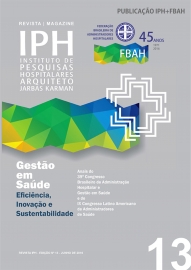Publications IPH Magazine IPH Magazine 13th: Annals Hospitality at the Service of Humanization

- Editorial - 13th
- HEALTH MANAGEMENT: Efficiency, Innovation and Sustainability
- Health Management Focused on Efficiency, Innovation and Sustainability!
- CONGRESS FOR COST AND FINANCIAL MANAGEMENT
- Hospitals, networks and sustainability
- Cost Reduction through Process Review
- Integrating Business Management to the Assistance Management
- International experience on the compensation models
- The Future of Hospital System - The Sustainability Challenge of Small Hospitals
- Advances in Patient Safety: Indicators and Impact on Cost Assistance
- Prospects for Public Private Partnerships and the Partnership Arrangements with Health Social - Critical Analysis of the PPP Brazilian Experiences in Health
- ENGINEERING, ARCHITECTURE AND LOGISTICS CONGRESS
- Hospital Logistics: Intelligence at Service for the Health Manager
- PEOPLE MANAGEMENT AND LEADERSHIP CONGRESS
- Illusionist Performance: Transformation and Innovation in Tough Times
- Implementation Careers & Salaries: New Paradigms and Opportunities
- The Art of Leading Generations X, Y and Z - How to retain talent?
- Giving Back Over the Organizational Climate - Talent Retention Strategies
- Creative Practices to Innovate in HR
- HEALTH MANAGMENT CONGRESS
- Efficiency
- Efficiency (2)
- The Process of Change in Bolivia "Hospital Arco Iris" from Solid Hospital to Liquid Hospital
- PATIENT'S QUALITY AND SAFETY CONGRESS
- Impact of External Assessment in Brazil
- Impact of External Assessment in Brazil (2)
- Quality and impact of patient safety in the hospital financial result - Santa Casa de Misericordia de Maceió
- Quality and Safety Integration on Education Process
- Management
- The Apthapi as Innovation Strategy in the Humanization of Healthcare Hospitality
- The experience of the State Hospital Sumaré / Unicamp in management by care
- HOSPITAL HOTEL CONGRESS
- Hospitality in Patient Perspective
- Hospitality at the Service of Humanization
- Hospitality and Humanization
- Hospitals Infrastructure Trends aimed at Physical and Mental Comfort for Patients and Families
- The Multidisciplinary Integration of Beds Management as a Way to Seek Effectiveness
- Spirituality in Hospitals Focusing on Healthcare Hospitality
Hospitality at the Service of Humanization
Marcelo Boeger
Hospitality is an attitude. When put in a larger sense, we can see the domestic, social and commercial matters.
In the first perspective, we have attitudes that spring from values that people have, and shape their way of acting. In this context, in the domestic sphere, particularly personal.
The second perspective is the relationship that people show to strangers. Here I would like to propose that we commonly call Humanization.
The third perspective, brings the idea of compensation as the reason for hospitality, based on service and criteria linked to the level of services.
"The wider understanding of the hospitality suggests, first, that this is fundamentally the relationship built between host and guest. To be effective, you need to make guests feel that the host is being hospitable, by feelings of generosity, the desire to please and to see him, guest as an individual "(LASHLEY; MORRISON, 2004).
The hospitality attitudes in commercial business are characterized by being premeditated actions (trainable), linked to a number of elements, such as minimum service time parameters in each point of contact, team attitude by customers' wishes out of specification, team attitude of a complaint (within 24 hours), team attitude in the workplace, personal presentation requirements, among others in which processes with drawings and clear streams, team autonomy and clarity in the objectives of interface areas, results in huge efficiency for the customer: we announce that we are well prepared to serve them - even if to the client it feels something spontaneous - it was based on the desire of their managers - the staff has been trained extensively to achieve this level of quality.
Humanization actions occur, but via another path. How to enable a developer to be more human with his customers if it is not his natural reaction to this situation?
How to empower someone to love someone?
Obviously this happens via another path - that is via empathy and it is shown when we see actions that demonstrate that they care, that include someone - regardless of having to ask, train or stimulate. It is absolutely spontaneous. In this case, our leadership role is to raise awareness.
They should serve well, because they are paid to do so or because certain situations require greater relationship of the individual effort that is providing the service? And in health institutions, given the client's condition, virtually all situations require dealing with anxiety, fears, uncertainties, insecurities, and other very sensitive feelings.
Features are so intimate and genuine, a standard answer cannot have any legitimacy if these people are not, first, sensitized to the results of their work with respect to the direct and indirect benefits to be generated.
We need to make people aware of the reason they are acting in that activity and show them their importance in the customer service process. Otherwise, we are training them to be hypocrites. Of course they must meet well, but more than that, they should worry about the customer not only as a simple commercial exchange.
Humanization is moved by the offer; and hospitality, by demand. That is, it depends only on the employees' perception of the need to humanize. If they do not, there is not much the client can do to ask for it because, in most cases, he would not even know what to ask for or what could be done differently.
Godbout (2010) in his studies had already showed us that all hospitality attitude happens through an alternate equivalence, a requirement of reciprocity, in the case of commercial hospitality is based on compensation, but the social and domestic hospitality, only in love.
Marcelo Boeger
Holds a Master degree in Planning and Environmental and Cultural Management (2003), Master in Hospitality at Anhembi Morumbi University (2007). It is a partner and consultant at Hospitality Consulting. Coordinator and Professor of the Specialization Course in Albert Einstein Hospital Hospitality.
Send by e-mail:


